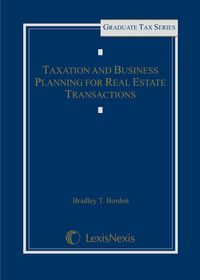
The abstract for the book reads in part:
This book focuses on tax planning in the real estate context. To adequately provide tax-planning advice, attorneys must be familiar with the transactional tax attorney’s analytical process. Transactional tax attorneys must recognize opportunities for tax planning and address issues that such planning may raise. Recognizing opportunities and addressing issues generally require a thorough understanding of the transaction and the relevant law. Such knowledge often derives from legal research and an in-depth study of primary-source legal resources, such as statutes, cases, regulations, and rulings. Legal research generally begins with treatises or articles that address the questions relevant to the tax-planning opportunity. That initial research leads the attorney to primary-source legal resources. The attorney then must interpret the law and apply it to a set of facts and provide advice.
To replicate the research process, each chapter of the book provides commentary that could be similar to . . . material typically found in a treatise, article, or other secondary source of legal authority. The commentary introduces ideas and legal concepts that apply to the questions and directs the reader to relevant primary legal authority. Ultimately, the students must carefully study, interpret, and apply relevant law to the issues raised by the questions. The commentary cites legal sources in the footnotes. The chapters reproduce relevant case law and rulings, but students will have to access the cited tax statutes and regulations in sources outside this book. The knowledge students will need to properly approach the material is largely contained in the law. In fact, students generally will not be able to fully understand and answer the questions until they have carefully studied the relevant law.
